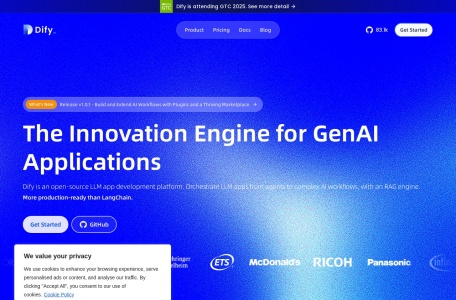What is Dify?
Dify is an open-source generative AI application development platform that helps users quickly build and deploy applications based on large language models. It supports a variety of mainstream models, such as DeepSeek and Ollama, allowing users to flexibly choose according to their needs. Dify offers zero-code and low-code development methods. Through simple configurations and a small amount of code, complex functions can be achieved, lowering the threshold for AI application development. Its core advantage lies in its powerful private deployment capability. Users can run it on local servers to ensure data privacy and security. Dify provides rich functional modules, supports multi-language development, and can be quickly deployed via Docker. It is suitable for individual developers or enterprise users to quickly build applications such as chatbots and intelligent customer service. It offers one-stop services from Agent building to AI workflow orchestration, RAG retrieval, model management, etc.
The main features of Dify
- Low-Code/No-Code Development: Dify offers a visual interface that enables developers to define Prompts, context, and plugins through drag-and-drop and configuration methods. This eliminates the need for in-depth technical expertise, thereby lowering the development threshold.
- Modular Design: Featuring a modular architecture, each module has clear functionalities and interfaces. Developers can selectively use these modules to build their AI applications based on specific needs.
- Rich Functional Components
- AI Workflow: Supports the construction and testing of complex AI workflows via a visual canvas.
- RAG Pipeline: Enables the complete process from document ingestion to retrieval, extracting text from common formats such as PDFs and PPTs.
- Agent Intelligence Agents: Leveraging the reasoning capabilities of LLMs, agents can autonomously plan tasks, invoke tools, and complete complex tasks.
- Model Management: Supports hundreds of proprietary and open-source LLMs, such as GPT, Llama2, etc., and provides model performance comparison features.
- Data Management: Dify offers powerful data management capabilities, including data annotation, data cleaning, data version control, and the upload and management of datasets in various formats.
- Tool Integration: Dify provides more than 50 built-in tools (such as Google Search, DALL·E, Stable Diffusion, etc.) and supports the development and integration of custom tools.
- Application Deployment: Supports one-click deployment of AI models, offering highly available and scalable deployment solutions.
- Monitoring and Management: Provides real-time monitoring and log management features to help developers quickly locate and resolve issues.
- Plugin System: Dify supports the development and management of a wide range of plugins, including tool plugins, extension plugins, and plugin packages, further expanding the platform’s functionality.
- Multimodal Capabilities: Through the plugin system, Dify can enhance the ability of LLMs to process multimedia content, supporting tasks such as image processing and video processing.
- Real-Time Debugging and Optimization: Supports real-time node editing and debugging, allowing developers to optimize AI applications during the development process.
How to Use Dify?
- Visit the Official Website: Visit the official website of Dify.
- Understand the Platform: Familiarize yourself with the interface and functions of Dify, including the visual orchestration tool and various modules.
- Environment Preparation: Ensure that your machine meets the minimum configuration requirements (CPU ≥ 2 cores, memory ≥ 4GB, hard disk ≥ 20GB), and install Docker and Git.
- Install Dify: Clone the Dify repository via Git and start the service using Docker Compose.
- Initial Configuration: Access http://localhost/install, set the administrator account and password, and configure the model supplier.
- Create a Knowledge Base: Upload files (such as PDF, TXT) or connect to external knowledge bases to provide context for AI applications.
- Build Applications: Configure applications through the visual interface, select models and knowledge bases, and set prompts and workflows.
- Test and Deploy: Test the application locally. After confirming that everything is correct, deploy it to the production environment.
- Monitor and Optimize: Use Dify’s monitoring function to view the application running status and optimize performance.
Application scenarios of Dify
- Dialogue Robots: Build intelligent customer service or chatbots to provide 24/7 customer service and interactive experiences.
- Content Creation: Automatically generate text content such as articles, blogs, reports, etc., accelerating the content production speed.
- Data Analysis: Automatically parse and summarize large amounts of data to provide insights and support for business decision-making.
- Document Automation: Automatically generate and format business documents such as contracts, reports, and presentations.
- Knowledge Management: Integrate the enterprise knowledge base to provide intelligent search and Q&A services, enhancing knowledge sharing.
Similar Sites

Wordware

SiliconFlow

Apache MXNet

TensorFlow

Momen

Label Studio

Scikit-learn

